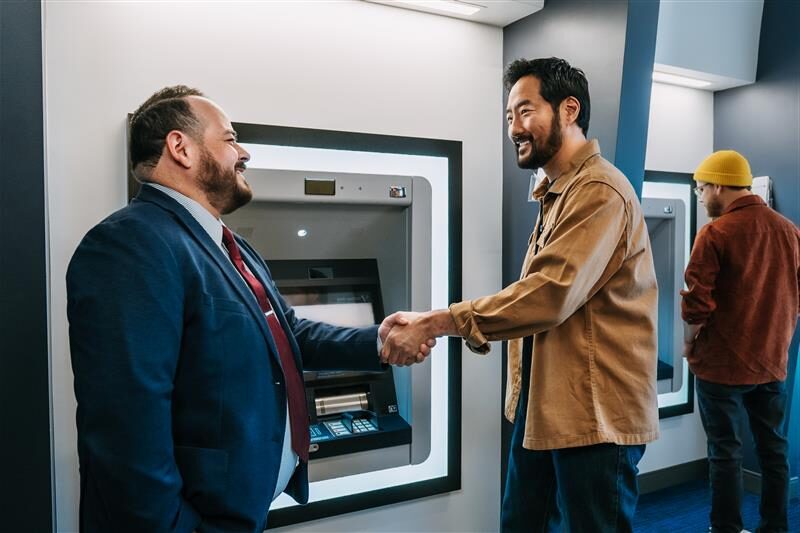Walking into the Phoenix office of Goodmans Interior Structures, you’re introduced to a sensory explosion of translucent glass doors, sculptures, art, and books. Employees freely traverse the floor, some at standing desks, others convening around the numerous common areas. One would be forgiven for mistaking the furniture company for a tech startup.
According to CEO Adam Goodman, it’s all part of a plan. The office’s design is meant to stimulate the team’s creativity while providing a flexible workplace that frees employees to work wherever they feel most comfortable. By allowing his team to choose where they work, Goodman says that “we want our employees to consider themselves shoppers.”
“Our latest iteration reflects changes in the workplace,” Goodman says. “In the past, you were expected to work in a single cubicle or desk all day. Now we say that your desk is your home base but you’re free to wander and find the place that fits the task.”
The unique office setup is just one way that Goodman has positioned himself as a leader in the Arizona conscious capitalism movement, a philosophy urging businesses to consider their decision’s impact on their employees, customers, and the surrounding community.
Since pivoting the company toward conscious capitalism, Goodman has helped introduce a flurry of charitable giving, aid to nonprofits and programs that aim to lift the Arizona community. The approach has earned him plaudits, such as the 2012 Impact Company of the Year Award and the 2013 Better Business Bureau Ethics Award, along with being named to the 500 Game Changers list, which highlights 500 companies around the world using business as a force for social change.
Goodman Becomes Conscious
Starting with the company’s founding in 1931 by Edward and Anna Goodman, Adam says that the business always had a reputation for philanthropy. But it wasn’t until the early 2000s that Goodman decided to officially focus on their community impact.
“The sense of community was always there, it’s part of our DNA,” Goodman says. “But we hadn’t yet articulated its purpose.”
The change was stimulated by the book Conscious Capitalism, co-written by Whole Foods CEO John Mackey. Goodman outlined the book’s two major takeaways: The first urges businesses to adopt a long-term view of their operations while the other encourages managers to acknowledge that business decisions affect customers, suppliers, and everyone involved in the sales cycle.
Goodman took his interest in conscious capitalism to the next level in 2011, this time sparked into action by an NPR segment on benefit corporations.
Benefit corporations are a relatively new innovation to the American economy. Maryland signed the first piece of benefit corporation-related legislation in 2010, with Arizona passing their own legislation in 2013. Arizona law defines a benefit corporation as a business that “creates a material positive impact on society and the environment” and requires “considerations of non-financial interests when making decisions.”
To Goodman, learning about benefit corporations “opened up this whole new world.” Rather than simply wishing that his business were more socially responsible, Goodman could now have conscious capitalism legally become the company’s driving purpose. With that, Goodmans became only the second registered benefit corporation in Arizona.
It Starts With Employees
With Goodmans now a benefit corporation, Goodman realized he needed to approach his employees differently in order to live up to his stated purpose of empowering all stakeholders.
“I realized that while I might be good at the business side of things, our purpose remained selling as much as we could,” he says. “We wanted to reframe everything so that we could give our employees a good reason to get out of bed while attracting similarly-minded people.”
This values-first approach sometimes meant making decisions that might appear counterintuitive for a growing business. Goodman mentions the instance of Michele Wright, a successful sales manager who expressed a desire to play a larger role in the company’s charitable arm. Most managers would have shrugged the suggestion off, but Goodman felt compelled by his company’s new all-encompassing focus on giving.
He ended up putting Wright in charge of the company’s nonprofit, Rooted in Good, an employee-run 501(C)3 allowing Goodmans team members to find opportunities for community involvement. While Goodman says “she was a high seller,” he felt that “this role fit her better.”
Wright approached Goodman about creating an opportunity to help foster families in the area. As an adoptive parent herself, Wright understood the challenges facing this community and thought the company was in a unique position to help.
Goodman supported her mission by providing warehouse space, delivery trucks, donation bins and marketing support. The result was GoodTHREADS, a program that gives away clothing and accessories to foster, adoptive, and kinship families. Since 2016, the clothing bank holds a clothing exchange every second Saturday and has clothed over 12,000 children.
Giving In Surplus
Utilizing surplus talent and resources helps guide the company’s plethora of philanthropic programs. Goodman says that each program begins with the question of “what do we already have?” This enables the company to provide a multitude of services with no incremental costs.
One example of this approach is Good, Inc, which supplies workspace, conference and mail rooms for 10-12 small businesses whose values align with Goodmans. Participating businesses also receive expertise on sales, marketing, technology, and more, creating what Goodman refers to as a small business incubator.
In addition to giving expertise, Goodmans offers their surplus furniture and supplies free of charge to local nonprofits. “Normally when companies want their old furniture out, they throw it away,” Goodman says. “But we look at it as a surplus that we can give to the community. So everyday, nonprofits come shopping here for free.”
Achieving the Purpose
Many doubt that a business can grow without a singular focus on earning profit, but Adam Goodman proves that a company can thrive by putting community first. He credits this success to adhering to a single purpose that everyone can get behind.
For businesses looking to adopt the conscious capitalism ethos, Goodman recommends the upcoming Conscious Capitalism Conference, held in Gilbert, where he will meet with “as many businesses as [he] can” to find the latest innovations in philanthropy.
His best advice for businesses looking to model Goodmans’ experience is to adopt a long-term focus. “Be clear about your purpose,” he says. “If you’re out to just make a buck, then it’s not sustainable. If you have a longer-term vision and design the company to fulfill that sense of purpose, a business is more likely to succeed into the future.”



